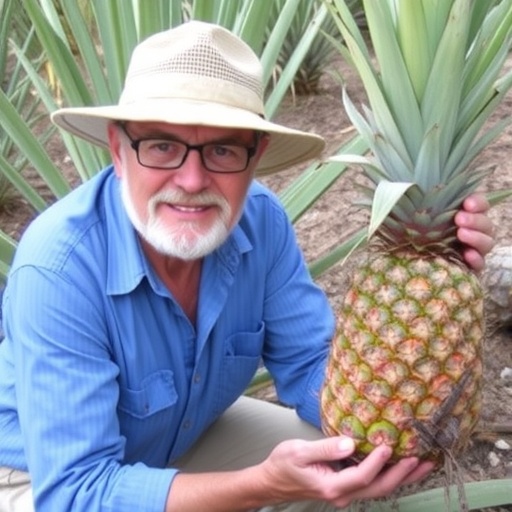In the heart of Central Cameroon, a significant study has unveiled crucial insights into the mineral composition of agricultural soils, specifically those cultivated for pineapple farming in the region of Awae. This area, characterized by its rich biodiversity and farming potential, has served as an ideal setting for a comprehensive assessment of soil quality in relation to trace elements. The research highlights the delicate balance required for optimal agricultural output, drawing attention to the often-overlooked significance of soil chemistry in sustaining crop growth and yield.
Trace elements, though present in minute quantities, play critical roles in plant physiology and soil health. The study meticulously examined the presence of essential trace elements, such as zinc, iron, copper, and manganese, within the soils of Awae, aiming to understand how these elements influence both soil quality and the health of pineapple crops. The research team employed a combination of field sampling and laboratory analyses to quantify these elements, establishing a robust dataset that reflects the soil’s nutritional status.
Understanding trace element dynamics is paramount, as deficiencies can lead to stunted growth and ultimately reduced crop yields. The findings of the study indicate that while some trace elements are sufficiently present, others are notably deficient, warranting further investigation. For instance, zinc, which is vital for several enzymatic processes in plants, was found to be below the recommended levels in several sampled locations. This deficiency may hinder not only the growth rates of pineapple plants but also the overall land productivity in Awae, suggesting a need for targeted soil amendments.
Furthermore, the researchers delved into the relationship between soil quality and trace element availability. Soil management practices, including fertilization strategies and land use, significantly influence the bioavailability of these elements. The study emphasizes that organic matter content and soil pH are critical parameters that dictate trace element solubility and mobility in the soil matrix. This interrelationship posits that effective soil management practices are essential for enhancing nutrient availability and improving crop performance in pineapple farming.
As the world faces increasing agricultural pressures, the sustainability of farming practices becomes a priority. The research conducted in Awae serves as a vital reminder of the intersection between soil health and food production. It underlines the necessity for farmers and agricultural stakeholders to adopt soil assessment techniques regularly, which can guide them in making informed decisions about soil amendments, crop rotation, and other agronomic practices. By adopting a proactive approach to soil management, the farmers of Awae can safeguard their crops while simultaneously enhancing soil fertility for future generations.
Moreover, the study’s implications extend beyond the immediate agricultural context. Soil degradation, often exacerbated by indiscriminate use of chemical fertilizers, poses a risk to environmental sustainability. By advocating for sustainable soil practices, the researchers stress the importance of conserving soil health not just for current agricultural needs, but as a vital resource for biodiversity and ecosystem functions. The balance between agricultural productivity and environmental stewardship is a central theme of the findings, echoing a global call for sustainable farming solutions.
Public awareness of soil health has grown, yet there remains a notable gap in knowledge regarding the specifics of soil nutrient management among farmers. Engaging local farming communities through workshops and outreach programs can facilitate the dissemination of the study’s findings and promote best practices in soil management. By empowering farmers with the knowledge of trace element importance and soil health, the potential for improved agricultural outputs can be realized, ultimately benefiting both farmers and consumers.
This research also opens avenues for further investigations into the effects of climate change on soil quality and trace element availability. As weather patterns shift due to global climate change, understanding how these variations impact soil chemistry becomes increasingly crucial. Future studies could focus on the resilience of soils to changing climatic conditions and the adaptations necessary for sustaining agricultural productivity in the face of environmental stressors.
The socio-economic implications of improved soil quality in pineapple farming are significant. As Cameroon seeks to enhance its agricultural exports, particularly of cash crops such as pineapples, fostering soil health can lead to enhanced yield and quality, potentially tapping into lucrative international markets. This synergistic relationship between sustainable soil management practices and economic viability presents an opportunity for development and growth in the region’s agricultural sector.
In conclusion, the in-depth assessment of trace elements in Awae’s pineapple-cultivated soils serves as a pivotal step toward understanding and enhancing agricultural practices in Central Cameroon. As we glean insights from such studies, it becomes clear that the future of farming in the region will rely heavily on informed soil management strategies that emphasize the significance of trace elements. By prioritizing soil health, the farmers of Awae can cultivate not just pineapple crops, but also the sustainable future of their agricultural landscape.
The research article by Kamguem Fotso and colleagues serves as an essential resource for understanding the intricate dynamics of soil health and agricultural productivity. It emphasizes the necessity for community engagement, sustainable farming practices, and continued research in the field of soil science, thereby contributing to the global discourse on sustainable agricultural practices.
Subject of Research: Soil quality and trace element levels in pineapple-cultivated soils of Central Cameroon.
Article Title: Trace element levels and soil quality assessment in pineapple-cultivated soils of Awae, Central Cameroon.
Article References:
Kamguem Fotso, C.A., Tehna, N., Ekoa Bessa, A.Z. et al. Trace element levels and soil quality assessment in pineapple-cultivated soils of Awae, Central Cameroon.
Environ Monit Assess 197, 1134 (2025). https://doi.org/10.1007/s10661-025-14536-y
Image Credits: AI Generated
DOI:
Keywords: Soil quality, trace elements, pineapple cultivation, sustainable agriculture, nutrient management, Cameroon.




